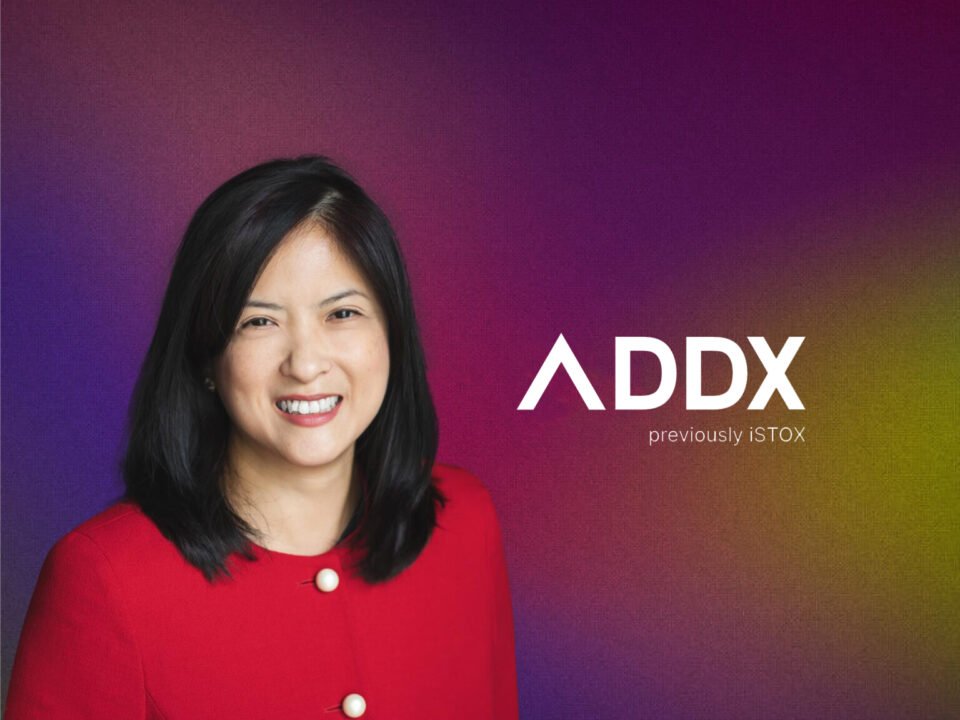Hi Oi Yee, tell us more about your journey and role at ADDX
ADDX is on a mission to democratise private capital. When companies issue private equity or funds or wholesale bonds, they typically require high minimum investments – USD 1 million or more – because the process of issuing, distributing and servicing these securities is still very manual, and it would not be cost efficient to have to manage too many investors.
The emergence of blockchain and smart contract technology has been a game changer. Securities can now be issued digitally – or in tokenized form – allowing processes to be automated. ADDX is therefore, able to fractionalize these investments and reduce minimum sums to USD 20,000 or lower. That makes private market investing accessible to a much larger group of individual accredited investors.
As Chief Commercial Officer, I oversee our efforts to grow the business. That means helping issuers understand why raising capital digitally brings benefits such as lower cost, faster issuances and access to a bigger pool of capital. It also includes bringing new individual investors to our platform. We have conversations with them on why entering the private markets with bite-size investments helps them build better and more stable portfolios – because private market products have a low correlation to the public markets, especially in times of higher volatility.
As a startup, ADDX has received strong validation from our investors, raising USD 50 million in our Series A round from major institutions like Singapore Exchange, Temasek subsidiary Heliconia Capital and Japan government-backed investors – the venture capital arm of Japan Investment Corporation as well as the Development Bank of Japan. We will use the newly raised capital to expand our geographical reach and our suite of products, to help more people invest in the private markets.
Can you share a few thoughts on how digital securities platforms the world over need to evolve to meet today’s challenges?
The pandemic has accelerated digitisation across many industries, including the private capital markets. When offered a digital-only service, the question consumers and investors ask today is no longer “why” but “why not”. ADDX is at the forefront on this wave of change in two ways – the investment products we offer are fully digital, and we also reach our users digitally. The pandemic has, in some ways, opened up meaningful conversations for us.
The markets have also been more volatile during the pandemic, which makes digital securities platforms more relevant than ever. Having private market products in your portfolio is more important for enhancing both resilience and returns.
The pandemic prompted some issuers to move capital raising projects or issuances, from 2020 into 2021. As a result, we are seeing a strong increase this year in the number of issuer discussions.
Also Read: Global Fintech Interview with Mark Williams, CFO at Sinequa
What are your predictions you have for the digital securities market: how do you feel the future of this niche is set to look like?
At ADDX, we believe all private market issuances will eventually be digital. This is a huge space. Bain, for example, estimates that the private equity market is 4.5 times the size of the public markets. As more issuers come on board and are willing to allocate a bigger share of each issuance to digital securities, the opportunities will expand for individual accredited investors who are looking for high-quality assets. With the middle class adding to their wealth fairly rapidly in Asia and other regions, we also expect this latter group to increase in number.
What does this mean in the long run? First, unicorns will be able to stay private for longer thanks to the new source of pre-IPO capital available to them. This gives them space to focus on growing their businesses without having to think about declaring rising profits every quarter. For investors, access to private market products means a chance to benefit from the higher-growth phase of unicorns. Over the past 10 years, global private equity returned 13.2% on average, roughly double the returns from public equity, according to a report by Cambridge Associates.
On the whole, we see the future of investing as a much fairer one, where smaller players are not excluded from the most lucrative opportunities.
Tell us more about the top fintech trends in Singapore and APAC. What is driving change in fintech?
A progressive regulator willing to imagine a financial system that is different from the current one is very important in driving change. The Monetary Authority of Singapore (MAS) takes a sandbox approach to innovative products and business models by fintechs. ADDX entered the MAS fintech regulatory sandbox in May 2019 and graduated in February 2020 as a fully licensed platform for the issuance, custody and secondary trading of digital securities.
Fintech startups need to be given the chance to prove themselves, and MAS understands that. They know that if they only give licenses to companies with a long track record, it will be much harder for new ideas to emerge. Ultimately, individuals benefit most from a more vibrant and competitive financial sector, as they will enjoy cheaper and better products.
Also Read: Global Fintech Interview with Arun Krishnan, SVP and Head of Engineering at Infosys Finacle
What’re the most exciting fintech startups from the APAC region that global businesses?
Digital securities platforms will see significant growth. Notably, this is a sector that can drive the growth of other fintech sectors, because digital securities open up a more efficient way for startups to raise capital. Closely related to digital securities is WealthTech, which will likely expand too, given the rise of the middle class and high net worth group and their increasing openness towards engaging with investing platforms digitally instead of going through a traditional relationship manager.
Digital banks will also expand their mindshare and market share, as central banks in Hong Kong, Singapore and Malaysia have now issued or are soon issuing licenses to new entrants. In Singapore, we will start to see in the coming year the new digital banks roll out strategies for attracting customers from traditional banks. It will be interesting to observe which business verticals within banking they choose to focus on first.
Digital banks are important for another reason: In Europe, digital banks show a much keener interest in collaborating with fintechs, because they see themselves as a core part of the fintech ecosystem. So all eyes will also be on potential tie-ups between Singapore digital banks and fintechs.
Before we wrap up, a few biggest learnings and tips you’d like to share with fintech innovators and leaders:
The fintech journey is difficult but rewarding. In the aftermath of the Great Financial Crisis of 2008, consumers changed how they view their relationship with financial institutions. There is now much greater receptiveness towards fintech products, because they are more efficient and more user-friendly.
What has ADDX learned that may be relevant to other startups? First, it is important to have a clear mission. What is the pain point among customers that needs to be solved? What is the innovation you bring to the market to address that pain point, and why haven’t existing players implemented your solution? Having clear answers to these questions helps you stay focused on your mission. Second, fintechs can’t do anything in isolation. We need the support of the regulator and other players within the ecosystem to carry our vision to reality. That takes humility, a willingness to collaborate and an ability to see things from the point of view of another company or institution.
Also Read: Global Fintech Interview with Shivani Govil, CPO at CCC Information Services
Oi Yee is Chief Commercial Officer of ADDX and oversees the growth of the company among issuers and investors. She has 20 years of capital raising and M&A advisory experience. Before joining ADDX, Oi Yee was with UBS for six years, and was Head of Investment Banking for UBS Singapore.
Oi Yee graduated from Nanyang Technological University with a Bachelor of Accountancy. She also has a Master of Business Administration from Manchester Business School.
ADDX brings private market access to individuals.
Using blockchain and smart contract technology, ADDX tokenizes and fractionalizes multi-asset securities such as hedge funds, wholesale bonds and unicorn equity, overcoming manual processes in the traditional issuance and investment space that have hitherto made it impossible to serve large numbers of smaller investors. The creation of regulated security tokens reduces the minimum investment ticket size for private market investments from USD 1 million to USD 20,000 or less.
Regulated by the Monetary Authority of Singapore’s (MAS) as a platform for the issuance, custody and secondary trading of digital securities, ADDX is backed by Singapore Exchange (SGX) and Temasek Holdings subsidiary Heliconia Capital.

